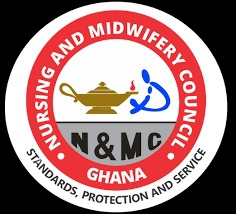 Nursing and Midwifery Council Ghana logo
Nursing and Midwifery Council Ghana logo
Investigations into some projects at the Headquarters of the Nurses and Midwifes Council point to some under-hand dealings that could be channeling state money into undeserving hands.
Documents covering the processes and cost of a File House constructed at the Headquarters of the institution near the Gulf House, South Legon contain some questionable decisions made by the Registrar, Felix Nyanteh and his management.
On October 15, 2015, the Council’s Registrar wrote to the Public Procurement Authority (PPA) for a Restricted Tender to award the contracted valued at four hundred thousand Ghana cedis (GHC 400, 000, 00) and got approval for same on October 23, 2015.
However documents covering some of the expenditure on the construction show that at least two of the purchases for the contract had been done in September 2015, even before even writing to PPA.
The three construction firms listed in the Request for Restricted Tender document approved by the PPA: LIDA Ghana Limited, Proslyn ltd and Kodson Transport Ltd.
It is however clear from the documents covering payments for the work done, that none of the three companies got any close to the contract as the work may have been done by someone within the organization.
In a petition to the Minister for Health, Alex Segbefia, the workers revealed under anonymity that official vehicles of the council were used in purchasing materials for the construction, suggesting that none other than the Registrar executed the contract on his own.
It is however unclear why the PPA granted the request for Restricted Tendering in this particular case.
Section 38 of the Public Procurement Act(Act 663) establishes the grounds for restricted tendering as follows:
“(a)if goods, works or services are available only from a limited number of suppliers or contractors; or (b) if the time and cost required to examine and evaluate a large number of tenders is disproportionate to the value of the goods, works or services to be procured.
Section 39 establishes the procedure for restricted tendering as (1) Where a procurement entity engages in restricted tendering on the grounds referred to in section 38(a), it shall (a) invite tenders from the suppliers and contractors who can provide the goods, works or services; (b) select in a non-discriminatory manner, a number of suppliers or contractors to ensure effective competition.
(2)Where the procurement entity engages in restricted tendering, it shall cause a notice of the selective-tendering award to be published in the Public Procurement Bulletin. (3) The provisions of Part V of this Act, except section 47, shall apply to selective tendering proceedings, except to the extent that those provisions are varied in this section.
As to whether the construction of the half-deck storey building meets such a requirement to be awarded on restricted tender is anybody’s guess.
Moreover, a look at the Financial Administration Act, (Act 654) 2003 also reveals gross violations of sections of the Act on the processes leading to payment for contracts purportedly done for the state.
Meanwhile, the Registrar Felix Nyanteh has refused to respond to the questions when scouts sent out questioned the Registrar and his assigns verbally and in writing about the Evaluation Reports on the contract, Pre-Auditing and Certificate of Completion among others covering the project and payments.
Reliable information has it that the Minister for Health, Alex Segbefia after receiving the petition from the aggrieved workers officially queried the Registrar to which Nyanteh responded, but checks from the Public Relations Officer (PRO) of the Ministry of Heath as to what the next action has been yielded no response.
Employees at the council who spoke under condition of anonymity want the contracts investigated and properly audited to establish the real cost.